Results
-
 £115.60
£115.60Hard to Say I'm Sorry - Peter Cetera
"Hard to Say I'm Sorry" is one of the greatest hits by US rock band Chicago. It was the first single record from the "Chicago 16"-album (1982). The song went to no. 1 on the Billboard charts and stayed there for two weeks. Produced by David Foster, the song was given a typical early 80's sound with synthesizers and heavy guitars dominating the sound. The album-version of the song included a part two of the song, "Get Away", a up-tempo song featuring the famous horn-section of the band.
Estimated dispatch 7-14 working days
-
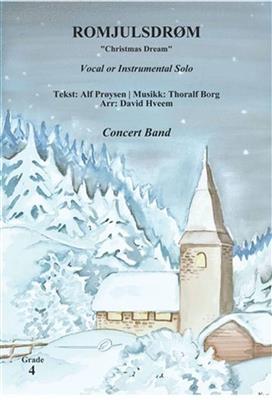 £115.60
£115.60Romjulsdrm - Thoralf Borg
The poem Romjulsdrm ("Christmas Dream") was first published in Arbeiderbladet on January 3rd 1959, and became known when Thoralf Borg set a melody to it in 1968. Up until this, Alf Prysen had used a melody quite similar to the song Lijan uti dalen, when he sang the song in the TV program Ei vise vil jeg synge in 1964. At the same time that Borg's melody was written, the last four lines of text were also added to the poem, and the song took on the form we know today.The form and structure of this arrangement originates from a version for big band and vocals commissioned by stre Toten Storband, written in 2018 for one of their traditional midnight concerts on the day before Christmas. In an attempt to give the arrangement a nice calm and the text a lot of room, as is often the case in songs like this, it ended up in a relatively narrative style where the variation in tempo and the shifts between swing and straight eighth notes are particularly central.The song is about family, friendship and the quiet days of the Christmas holidays, which hopefully is something most people can recognise. The arrangement for the aforementioned midnight concert was ordered because my sister was to be the soloist for the concert, and since my father also played lead trombone - as he has done in this big band for as long as I can remember - it was natural to add a small trombone solo as well. It's always special to write and arrange music for people I know and appreciate, but it's extra special when it's also for two of my great role models.- David Stre Hveem -
Estimated dispatch 7-14 working days
-
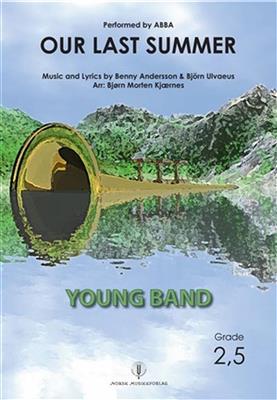 £115.60
£115.60Our Last Summer - Benny Andersson
An exciting arrangement where almost all players have a bit of the melody line. There are many opportunities to give individual musicians soloistic challenges. Any bandmember should find something interesting in this piece. It will be possible to add vocals to the arrangement. A lovely melody with great expressions.Our Last Summer" is a song by the Swedish pop group ABBA from their seventh studio album, "Super Trouper," released in 1980. The song is indeed featured in the musical "Mamma Mia!", a little bit shortened and with small changes in the lyrics. The musical premiered in London's West End in 1999 and is a duet performed by the characters Harry Bright and Donna Sheridan, reflecting on their past romance during a summer spent in Paris.The song is primarily sung by Bjrn Ulvaeus, with backing vocals provided by Agnetha Fltskog and Anni-Frid Lyngstad, the female members of ABBA. Their harmonies contribute to the song's nostalgic and wistful atmosphere. The lyrics vividly describe the memories of the summer spent together, including scenes of walking along the Seine River in Paris and listening to French songs. The song also touches on the passage of time and the realization that the summer romance has ended.While not released as an official single in most countries, "Our Last Summer" still received considerable airplay and became a fan favorite. It charted in some European countries and has remained popular among ABBA fans over the years.
Estimated dispatch 7-14 working days
-
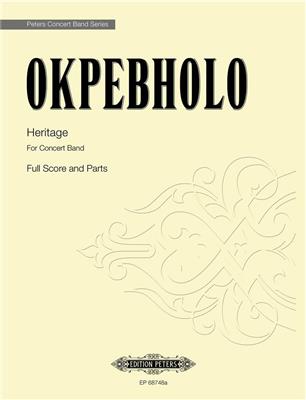 £119.00
£119.00Heritage - Shawn E. Okpebholo
Shawn Okpebholo's Heritage, in the Edition Peters Concert Band Series, evokes moods, events and sounds (including West African drumming and indigenous melodies) from an ethnomusicological research visit the composer undertook to Nigeria. One of the primary musical themes of the work is an adaptation of a song that comes from the Esan people, a small ethnic group in the southern part of Nigeria and the tribe to which the composer has deep historical and family ties.The Esan language is poetic in nature and, at various moments in the work, the musicians chant the text from an Esan song: Ekine leleyea do obhimen la doeki nalo (My investment in you is paid off. Because of your hard work, your future is bright).Heritage is a revised version of a work previously entitled This is Africa, which was commissioned by Professor Marcellus Brown and the Boise State University Symphonic Winds for the 2011 National CBDNA Convention and is dedicated to the memory of Dr Harry Begian.
Estimated dispatch 7-14 working days
-
 £144.99
£144.99Suite Marchigiana - Luciano Feliciani
According to a famous statement by Herder, folk songs represent the archives of a nation's knowledge, the expression of its heart and theimage that reflects its history and identity. Suite Marchigiana is a three movement piece, inspired by folk songs from the Marche in central Italy, a region with a very ancient and rich folkloristic heritage. The first movement elaborates on the well-known Pasquella. The Pasquella comes from a traditional winter begging ritual where a group of musicians go from house to house singing verses, wishing their audience good health, wealth and abundance, in return for small amounts of money, food and wine. The second movementis an Andante Triste inspired by an old song called Sona la mezzanotte (The Clock Strikes Midnight), a melancholic song that reminds us of unhappy love stories, bereavement, and so on. Luciano Feliciani concludes the suite with the Saltarello Marchigiano, which is bright and sparkling, and therefore in complete contrast with the previous movement. Although unproven, the Saltarello is thought to have its origins in the 'saltatio' (a latin dance). While the choreae were group dances, circular in structure and with a rhythmic progression, the saltationes were more lively in character. The fast, frenetic and joyous saltarello was without any doubt the most famous musical expression of rural central Italy in the nineteenth century.
Estimated dispatch 7-14 working days
-
 £94.99
£94.99Gaudete!
'Gaudete' comes from the Finnish/Swedish 'Piae Cantiones', a collection of religious music from the 16th century. The English folk group 'Steeleye Span' featuring female lead singer Maddy Prior had a hit with this song in the seventies. Peter Martin made a scintillating arrangement for wind-band. By the use of fourths and thirds in the melody the composer harks back to the period from which the song originated (The Middle Ages)
Estimated dispatch 7-14 working days
-
 £72.99
£72.99For Heaven and the Future - Samuel R. Hazo
The title of this expansive work from Samuel Hazo draws inspiration from a Robert Frost poem, and the thematic material is a creative interpretation of the English folk song Seventeen Come Sunday. Differing from Vaughan Williams'treatment of the same tune in English Folk Song Suite, this setting remains at a slow tempo throughout and undergoes a myriad of changes through use of harmonic and textural variations. Beautifully and effectively paced with keyimpact points at just the right moments. Dur: 5:00
Estimated dispatch 7-14 working days
-
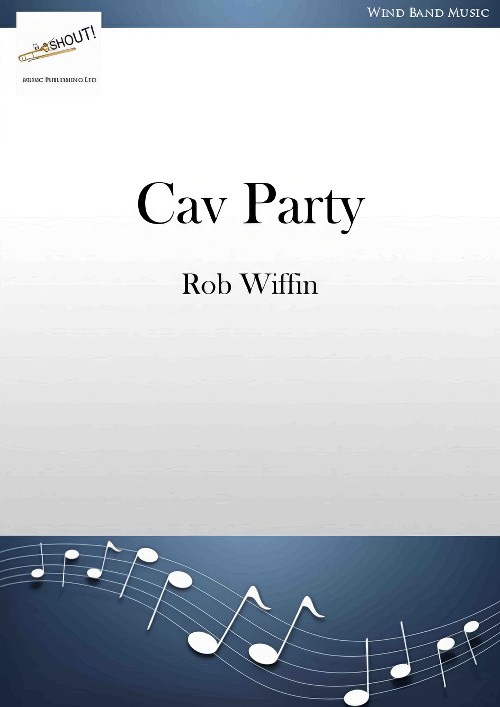 £49.95
£49.95Cav Party (Concert Band - Score and Parts) - Wiffin, Rob
Cav Party was commissioned by The Band of the Household Cavalry in 2020. The idea was to showcase the various musical elements of the band in a party piece that gets more boisterous as it goes on. It utilises three Eighteenth century melodies associated with the band, starting off with a folkish setting of Handel's March from Scipio for harp, violin, flute and cor anglais (all fully cued on regular wind band instruments) and then into Keel Row where the accordion is featured before the whole band enters, and finally to Money Musk. Both Keel Row and Money Musk are played as Trot Marches by the band.The regimental slow march Scipio comes from Handel's opera of 1725 The Mercy of Scipio, which was based on the life of the Roman General Scipio Africanus.Keel Row is a traditional folk song evoking the life and work of the keelmen of Newcastle upon Tyne. It was first published in 1770, although it could be considerably older. The opening lines of the song describe Sandgate, the part of the quayside overlooking the River Tyne to the east of the city centre where the keelmen lived.Money Musk, also known as Monymusk or Monnymusk was originally a pipe tune composed by Scottish fiddler Daniel (sometimes Donald) Dow (1732 - 1783) in 1776. It takes its name from a baronial estate in Aberdeenshire, Scotland called Monymusk House. The tune first appeared in Dow's Thirty Seven New Reels, c. 1780 under the title Sir Archibald Grant of Monemusk's Reel.Duration: 3.45
Estimated dispatch 7-14 working days
-
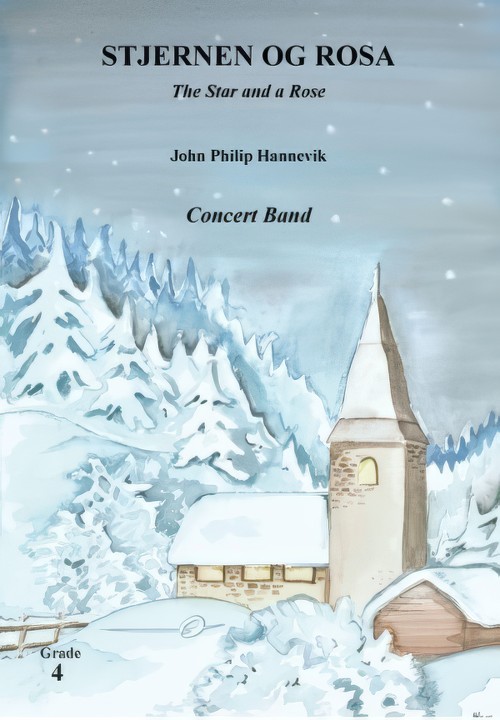 £122.20
£122.20Stjernen og Rosa (The Star and a Rose) (Concert Band - Score and Parts) - Hannevik, John Philip
The Star and a Rose is a big-scale Christmas piece for band, featuring four seasonal chorales.The first is a Gregorian-like chant Hodie Christus natus est.In this section of the piece, a soloist can be placed away from the band, maybe on a gallery. The soloist can be a tenor instrument, maybe trombone, or you can feature a vocal soloist. After this, the music leads us on to the old German Christmas chorale Lo, how a rose e'er blooming. This song is given a fairly rhythmical treatment, but make sure that the melody is presented in a cantabile style. An interlude follows, before the piece presents one of the most used and loved Scandinavian Christmas chorales, Mitt hjerte alltid vanker (My Heart will always wander), composed by the Danish bishop Hans Adolph Brorson around 1732. This song is building towards a climax, before the solo horn brings it all down to the Stable view described in the lyrics. Then comes a transition that brings us in to the final section of the piece, which presents the international Christmas Carol Adeste Fideles. As many will notice, I have borrowed a section from David Wilcocks majestic harmonization towards the end.The title of the piece has its background form the lyrics in My heart will always wander, where the text speaks about the stars in the sky. But also in the Latin text for Adeste Fideles: Stella duce, Magi, Christum adorantes. The Rose is of course from the lyrics in the chorale Lo, how a Rose.Duration: 10.30
Estimated dispatch 7-14 working days
-
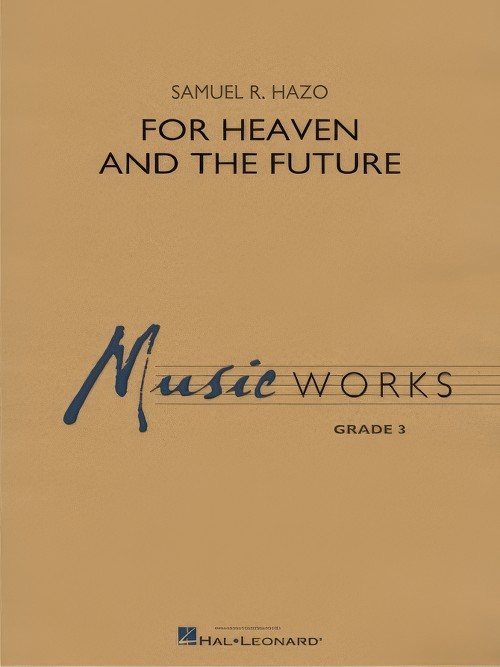 £72.99
£72.99For Heaven and the Future (Concert Band - Score and Parts) - Hazo, Samuel R.
The title of this expansive work from Samuel Hazo draws inspiration from a Robert Frost poem, and the thematic material is a creative interpretation of the English folk song Seventeen Come Sunday. Differing from Vaughan Williams' treatment of the same tune in English Folk Song Suite, this setting remains at a slow tempo throughout and undergoes a myriad of changes through use of harmonic and textural variations. Beautifully and effectively paced with key impact points at just the right moments.Duration: 5:00
Estimated dispatch 7-14 working days
